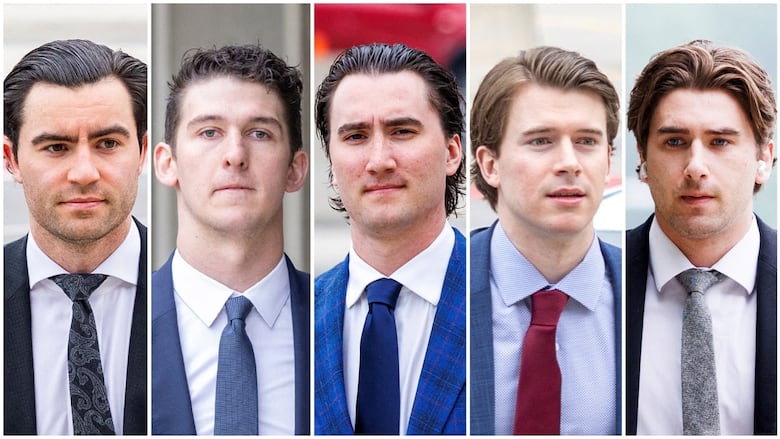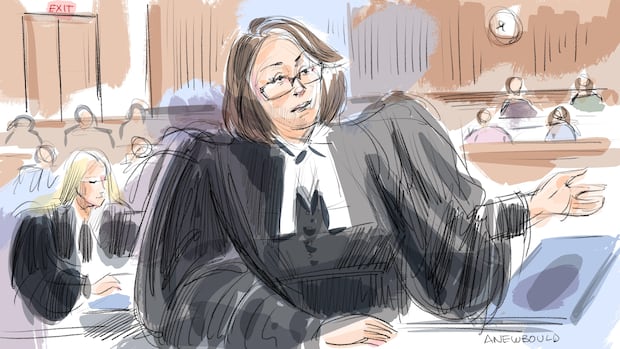What happens after Hockey Canada sex assault trial ended in not guilty rulings? Some key questions answered
Advocate, legal experts not involved in the Hockey Canada trial spoke to CBC

The London, Ont., sexual assault trial for five former world junior hockey players is over, with all found not guilty by Justice Maria Carroccia years after the case first came to prominence.
So what happens next?
Michael McLeod, Dillon Dubé, Alex Formenton, Cal Foote and Carter Hart on Thursday were found not guilty of charges stemming from their time in 2018 at a hotel in London, where they attended a Hockey Canada gala to celebrate their team's world championship victory. The lawyer for E.M., the complainant whose identity is protected by a standard publication ban, spoke about how devastated the woman was after Carroccia released her decisions.
In the wake of the eight-week trial and the rulings, advocates expressed concern about how they may impact victims and their willingness to come forward given the defence grilling of E.M. during her nine days of testimony.
Defence lawyers also spoke outside the courthouse about the scrutiny that the men, now all in their mid-20s, have faced since the allegations surfaced, how their lives have been affected and where they may go from here.
Although the judge spent over five hours giving reasons for finding the men not guilty, including around the complicated issue of consent, many key questions linger.
CBC spoke to an advocate and legal experts not involved directly in the case to get some answers.
How will this impact work to change sports culture?
Generation Safe founder Allison Forsyth said she's scared the verdict could "send us backwards" in efforts already started to change sports culture.
Forsyth, a sexual abuse survivor and mom of two young hockey players, encourages parents to push their teams to bring in training and education on sexual violence and consent, as well as hazing and bullying.
"Hockey Canada does have great folks who I know personally working within safe sport," she said. "However, I feel sometimes that I'm on an island out here, literally going team to team, club to club, province to province."
She said coaches and parents need to "take a deep breath" and respect where hockey culture is, and where it needs to go.
"Peer pressure, cultural norms, cultural legacies, traditions will far override our parenting," she said. "And until we get to a place where athletes don't feel like they have to succumb to horrible things, or do horrible things to fit in with their peers, we have a big problem."
Could there be an appeal? How would it work?
London-based criminal defence lawyer Sam Puchala said before Thursday's decisions that the Crown may appeal some of the pretrial or mid-trial application rulings around decisions to admit or refuse certain types of evidence, which could lead to a new trial.
"Those things can be contentious in the law, especially with prior sexual history or her medical records, things like that," said Puchala, who was in the courtroom for the rulings.
Peter Sankoff, a criminal defence lawyer and University of Alberta law professor, said it deals with a controversial area of law where some elements are not crystal clear — Carroccia was tasked with resolving big questions around consent, for example — raising the likelihood of appeals.
The Crown said after the rulings that they'd "carefully review" the decisions and would provide no further comments "as this case is still within the appeal period."
Sankoff said the appeal process works slowly. Parties have up to 30 days after sentencing to formally apply and both parties are likely to retain new counsel for the appeal case, he said.
He said he would be "stunned" if the case returned to the courts in under a year.
"I usually tell my clients that from the day they file to the day it's heard is a year, give or take. It can be longer; it's rarely shorter."

What will happen to the defence lawyer in the incident that led to mistrial?
Carroccia declared a mistrial in April, in a rare move just three days after a 14-person jury was selected, following a brief interaction between a defence lawyer and a juror during a lunch hour. A second jury was chosen and the trial went forward until May 16, when the judge again discharged the jurors after one of them accused a defence lawyer of making fun of the jury.
Carroccia and the lawyers then decided to proceed with a judge-only trial.
Legal experts say it is unlikely there will be any followup in terms of sanctioning lawyers.
"I think that that got blown out of context or there was a lot of misinformation around it, but there's not going to be anything coming from that because there was no wrongdoing," Puchala said, adding the issue was about a perception of fairness from the jurors.
Sankoff also said he would be surprised if anything was pursued around the mistrial.
"The judge didn't witness the conduct in question, so there's no way the judge is going to sanction the lawyer."
Could defendants launch civil suits?
Sankoff said the accused could, in theory, launch civil suits even though they were found not guilty, but it would be difficult and likely not practical.
He said it's hard to prove malicious prosecution on the part of the Crown or the complainant, and suing members of the media would also be complicated.
"They [the accused found not guilty] might scream and yell about suing because it has affected them, obviously. But generally speaking, you take the win and you go home," Sankoff said.
"It's very rare that anybody who's experienced the court system like they have turns around and says, 'I want to do that some more.'"
Puchala said there's a possibility the players could consider suing Hockey Canada, after courts heard the organization settled a lawsuit in 2022 relating to the London hotel incident without informing the players involved.
"There was a lot of money at stake in this case," Puchala said.
"It will depend on the level of loss and what the findings are, but it wouldn't surprise me if they tried."
Hart, McLeod, Foote and Dubé all had NHL contracts before the charges were laid early in 2024, but weren't re-signed and haven't played in the league since.
Will the accused suffer reputational damage?
The lawyers CBC News spoke with said reputational damage is likely, even if those accused are found not guilty.
"I see that every day with my clients," said Puchala. "They are accused of very serious things, and even if they're not high-profile people with public lives, they suffer these devastating consequences from the courts of public opinion, basically.
"People lose their jobs, they're alienated from friends and family, and that's even if the charges get fully thrown out."
Sankoff said there have been many high-profile cases involving people who were exonerated in the courts — but not by public opinion — and in his view, that's not necessarily a bad thing.
With files from CBC News



